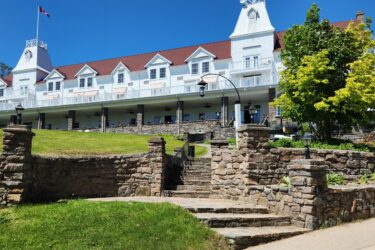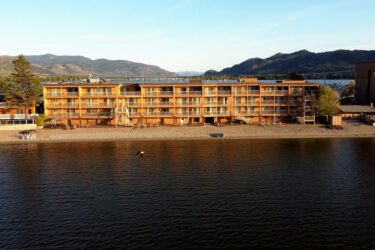
InnVest Hotels acquires The Algonquin Resort St. Andrews by‑the‑Sea, Autograph Collection and The Algonquin Golf Course
InnVest Hotels has acquired The Algonquin Resort St. Andrews by-the-Sea, Autograph Collection and The Algonquin Golf Course.
CALGARY — Industry stakeholders are justifiably concerned about hotel operations and hotel valuations in light of COVID-19. JT Dhoot and Tim TIndle provide an abbreviated case study to show how operations and valuation of a hypothetical 100-room branded limited-service suburban hotel would be affected.

By JT Dhoot and Tim Tindle
The economic damage caused by COVID-19 is expected to have immediate and long term impacts on the hospitality and lodging sector. Hotel owners, lenders, governments and other industry stakeholders are justifiably concerned about the many unknowns related to hotel operations and hotel valuations in light of COVID-19. This abbreviated case study provides an illustrative example with respect to the operations and valuation of a hypothetical 100-room branded limited-service suburban hotel (“the Hotel”) viewed from two perspectives on May 1, 2020 (the “Valuation Date”):
Comparing the forecasted operating performance of the Hotel based on these contrasting perspectives provides a basis for estimating the potential decline in value as a result of COVID-19. Market value is always estimated based on the facts and circumstances known at a specific point in time. In other words, when facts and circumstances change, so do values. In light of the foregoing, it is important to note the Without-COVID analysis herein is premised on the hypothetical assumption that there were no indications of a major global illness in early-2020 and therefore the World Health Organization (WHO) did not declare COVID-19 a pandemic on March 11, 2020.
Chart 1 illustrates the forecasted revenue per available room (RevPAR) for the Hotel based on the With- and Without-COVID scenarios.
The Hotel had finished 2019 with a RevPAR of $82 based on an average daily rate (ADR) of $125 and occupancy rate of almost 66 per cent. A stable economic outlook coupled with limited supply of new rooms entering the market suggested the Hotel would maintain its market share and increase RevPAR through modest gains in occupancy and average rate between 2020 and 2024. Consequently, the Hotel’s RevPAR in 2024 under the Without-COVID scenario was forecasted at almost $100 based on an occupancy rate of 67 per cent and ADR of $148.
Conversely, the Hotel’s forecasted RevPAR in 2020 under the With-COVID scenario was expected to decline to $35 based on an occupancy rate of 35 per cent and ADR of $100. Depressed occupancy levels were forecasted over the upcoming 12 to 18 month period although the Hotel was expected to see a return to pre-COVID occupancy within approximately three years. Average rates, however, were not forecasted to recover at the same pace and therefore the Hotel’s forecasted RevPAR was expected to remain below post-COVID levels throughout the forecast period with 2024 RevPAR estimated at $88 based on 67 per cent occupancy and $130 ADR.
Chart 2 illustrates the forecasted annual revenues and expenses for the Hotel based on the With- and Without-COVID scenarios.
Forecasted revenues under the Without-COVID scenario were expected to continue an upward trend, increasing from roughly $3.1M in 2019 to $3.7M in 2024. Operating expenses were also expected to increase although it was anticipated they would remain at roughly 60 per cent of annual revenue throughout the forecast period.
Forecasted revenues under the With-COVID scenario were projected to decline by nearly 60 per cent to $1.3M in 2020 before increasing in subsequent years to roughly $3.3M by 2024. In spite of variable cost savings, total operating expenses were forecasted at over 90 per cent of annual revenue in 2020 with additional costs associated with COVID-19 expected throughout the forecast period, including but not limited to:
Chart 3 illustrates the forecasted earnings before interest, taxes, depreciation and amortization (EBITDA) for the Hotel under the With- and Without-COVID scenarios, including the annual and cumulative variance between the two scenarios. In short, the unprecedented decline in forecasted revenues in 2020 coupled with relatively slow average rate growth and increased operating expenses throughout the remainder of the forecast period resulted in the forecasted shortfall in EBITDA amounting to over $3.0M under the With-COVID scenario. In other words, the Hotel was expected to generate $3.0M less in EBITDA between 2020 and 2024 as a result of COVID-19.
Chart 4 illustrates the hypothetical valuation summary which is explained in further detail below. In short, the estimated market value of the Hotel under the Without-COVID scenario was estimated at $17.3M whereas the With-COVID estimate was $12.5M, a decline of approximately $4.8M or 28 per cent as a result of COVID-19.
The value of a hotel operating as a going-concern is typically estimated using the Income Approach. The Direct Comparison and/or Cost Approach may be used to corroborate the Income Approach although these alternative valuation methodologies may also be useful in situations where a hotel is no longer a going-concern or if it no longer represents highest and best use. These circumstances, however, are beyond the scope of this analysis.
The Income Approach includes two related, yet distinct, methodologies:
In simple terms, the Income Approach satisfies the underlying principle of finance which states the opportunity to earn interest (a return) on money means that having cash in hand today is worth more than having the identical sum of cash in the future. In other words, this concept of the time value of money (TVM) recognizes that future cash flows need to be discounted to reflect the opportunities foregone by not having those cash flows in hand today.
In the context of hotel valuation, cash flows are comprised of:
Put another way, the value of a hotel today is worth the cash flows you and all future owners can expect to receive in the future because the underlying assumption is the anticipated stream of cash flows will continue in perpetuity (forever). When a hotel is operating at a ‘stabilized’ level, market participants can estimate the value of this cash flow stream by dividing the forecasted EBITDA for the upcoming year by an appropriate cap rate. Although this approach may be suitable in the Without-COVID scenario, it is not appropriate in With-COVID scenario as the Hotel’s forecasted EBITDA in 2020 is abnormally-low and not reflective of a “stabilized” level of performance. In light of the foregoing, the hypothetical valuation analysis herein is based on Discounted Cash Flow (DCF) Analysis.
The same discount rate (10 per cent) and terminal cap rate (8.0 per cent) were used for the With- and Without-COVID scenarios for the purpose of this case study. A comprehensive discussion on capitalization rates and discount rates is beyond the scope of this case study; however, it is important to note these metrics are influenced by various interconnected factors that are determined on a case-by-case basis, including but not limited to:
In an attempt to simplify the mathematical calculations underlying the estimated value of the Hotel under each scenario, Chart 4 illustrates the forecasted cash flows before and after discounting for the time value of money (TVM). More specifically, Chart 4 illustrates that an investor seeking to earn an unlevered internal rate of return (IRR) of 10 per cent would be willing to pay $12.5M today in exchange for the opportunity to earn a forecasted cash flow stream totalling $19.5M in the future (which is equivalent to the total cash flows before discounting, or the total cash flows discounted at 0 per cent). If the forecasted cash flows were to fall short of expectations, the purchaser’s IRR may be less than the 10 per cent which was anticipated based on the forecasted cash flows and the $12.5M purchase price today; however, a faster/stronger recovery resulting in cash flows in excess of the forecasted cash flows herein would result in the purchaser’s IRR exceeding 10 per cent based on the hypothetical $12.5M purchase price today.
SUMMARY
The duration of the COVID-19 pandemic, its short- and long-term impacts on the global economy and the resulting impacts on the lodging industry remain unknown. Nonetheless, hoteliers can expect to face challenging conditions in the short term as a result of drastic declines in revenues and shifting operating practices resulting in increased expenses and reduced profitability. Strong brands and professionally-managed hotels capable of offering guests a high degree of safety and confidence can expect to regain market share and recover faster than others; however, the speed and vigour of the recovery will vary by location (downtown, suburban, resort), hotel type (limited-service vs. full-service), composition of guests (corporate, leisure, group) and a variety of other factors. Many hotels have never operated at occupancy levels below 50 per cent for an extended period of time and therefore the new operating environment will require new ways of monitoring and modifying operating practices to maximize profitability without sacrificing a positive guest experience. Innovative operators willing to adopt new technologies and invest in their human capital (workforce) will be better positioned to maximize value in the short- and long-term.
JT Dhoot is a Chartered Business Valuator (CBV) and Accredited Appraiser (AACI) with over 10 years’experience in valuations, real estate development, and private equity. He can be reached by emailat jt@omnisvaluations.com, or by visiting his website: www.omnisvaluations.com.
Tim Tindle is a 35+ year hotel industry executive who is now providing independent consulting and asset management services to hotel & resort developers, owners and stakeholders. Tim can be reached at ttindletac@shaw.ca



InnVest Hotels has acquired The Algonquin Resort St. Andrews by-the-Sea, Autograph Collection and The Algonquin Golf Course.

The new owners of the famed Windermere House hotel and resort on Muskoka’s Lake Rosseau intend to revitalize the building and its amenities while preserving the property’s historical integrity.

Proactive Hospitality has acquired the Coast Osoyoos Beach Hotel, B.C. CFO Capital arranged acquisition financing for the deal.

Tribute Portfolio – part of Marriott Bonvoy's extraordinary portfolio of 31 hotel brands – continues to grow its global family of characterful hotels with Honeyrose Hotel Montreal, a Tribute Portfolio Hotel, the brand's…